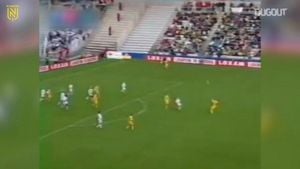49ers Enterprises, the investment arm of the San Francisco 49ers, is making headlines as it nears the completion of a deal for acquiring a 51 percent controlling stake in Rangers Football Club—the iconic Scottish soccer team. Sources close to the negotiations revealed to The Athletic this week the deal is expected to finalize within the next few months, pending necessary approvals.
This significant move has its roots going back to last year, with talks having progressed to the point where the structure of the deal is described as ‘well-baked’ by insider sources who prefer to remain anonymous due to confidentiality restrictions. The enthusiasm surrounding this acquisition reflects not only the 49ers’ strategic vision but also the global allure of investing within the sports industry.
Leading the charge in this acquisition is Paraag Marathe, the president of 49ers Enterprises and executive vice president of football operations. He brings two decades of experience with the 49ers and has already demonstrated his acumen within British soccer through the successful acquisition of Leeds United for £170 million (around $215 million) earlier this year. "The structure of the deal is already ‘well-baked’,” commented one anonymous source, emphasizing the solid groundwork already laid.
Considering the historical significance of Rangers, known for its deep-rooted rivalry with Celtic—a partnership often characterized as the Old Firm—this acquisition could reshape the dynamics of Scottish football. The potential for Rangers to access the lucrative UEFA Champions League by winning the Scottish Premiership only bolsters its appeal as a sound investment for 49ers Enterprises.
Currently, Rangers is managed by multiple shareholders—some with stakes exceeding five percent. The largest single-holder, New Oasis, owned by South African businessman Dave King, has been on the lookout to offload his share, stepping down from his chairman position back in 2020. Meanwhile, the club's recently resigned chairman John Bennett has also expressed readiness to sell. This alignment among key shareholders could smooth the pathway for 49ers Enterprises to secure command over the club.
With Celtic sporting dominance, having won 13 out of the last 14 titles, the prospect of Rangers bolstering its competitive stance could inject new life—and dollars—into the rivalry. Some pundits argue the investment could enable Rangers to sharpen their spending habits, reducing the significant annual losses the club has posted for years prior. “This is not unprecedented by any means though,” hinted one insider, referring to the financial fluctuations common within large football clubs.
The rivalry between Rangers and Celtic isn’t just about titles; it encapsulates culture, history, and passion among fans. The dynamic is shifting, and many eyes are set on the prospect of Rangers revitalizing their competitive edge. Investing heavily on key players and enhancing the squad could alter the current balance of power, which some see as potentially beneficial for Celtic, too. The increasing competitiveness would push them to strive for greater signings and improvements within their squad.
A Rangers takeover by 49ers Enterprises signifies not merely the acquisition of shares but also the potential for strategically aligned growth, and, undoubtedly, it reflects shifting tides within the world of professional football. Just last season, Rangers achieved success after their long absence from the Premiership title race, igniting hopes for supporters who cherish their beloved team.
For now, fans and analysts alike await final confirmation from the Scottish Football Association concerning the takeover, which remains pivotal to the transfer of power. This anticipated endorsement could open the doors for greater investment, sweeping changes, and perhaps, heralding the dawn of a new era for Rangers Football Club.
Should this acquisition proceed as planned, it will signal significant interest from American investors within European soccer, continuing to amplify the cross-continental ties bridging the two sports markets. Given Marathe’s vision and experience, coupled with the club’s rich history, there seems to be potential for real growth and reinvigoration on the horizon.



